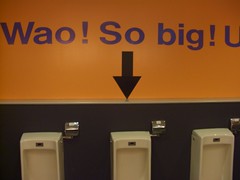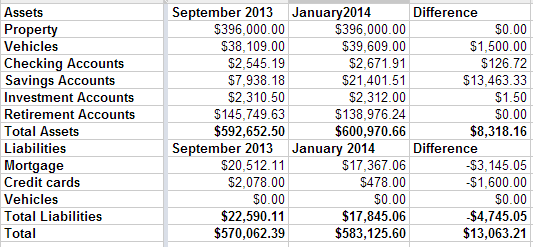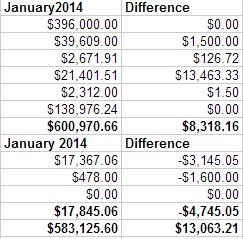- RT @ramseyshow: RT @E_C_S_T_E_R_I_: "Stupid has a gravitational pull." -D Ramsey as heard n NPR. I know many who have not escaped its orbit. #
- @BudgetsAreSexy KISS is playing the MINUTE state fair in August. in reply to BudgetsAreSexy #
- 3 year old is "reading" to her sister: Goldilocks, complete with the voices I use. #
- RT @marcandangel: 40 Useful Sites To Learn New Skills http://bit.ly/b1tseW #
- Babies bounce! https://liverealnow.net/hKmc #
- While trying to pay for dinner recently, I was asked if other businesses accepted my $2 bills. #
- Lol RT @zappos: Art. on front page of USA Today is titled "Twitter Power". I diligently read the first 140 characters. http://bit.ly/9csCIG #
- Sweet! I am the number 1 hit on Ask.com for "I hate birthday parties" #
- RT @FinEngr: Money Hackers Carnival #117 Wedding & Marriage Edition http://bit.ly/cTO4FU #
- Nobody, but nobody walks sexy wearing flipflops. #
- @MonroeOnABudget Sandals are ok. Flipflops ruin a good sway. 🙂 in reply to MonroeOnABudget #
- RT @untemplater: RT @zappos: "Do one thing every day that scares you." -Eleanor Roosevelt #
7 Benefits of Investing Internationally
 When it comes to financial investments, it’s always better to go with an informed decision than one that relies merely on chance – besides, gambling only works when luck’s on your side. Fortunately, international investments are a financially secure and reliable form of investing as long as you know your limitations. So, in keeping with the idea of sound financial decisions, here are seven benefits of investing internationally:
When it comes to financial investments, it’s always better to go with an informed decision than one that relies merely on chance – besides, gambling only works when luck’s on your side. Fortunately, international investments are a financially secure and reliable form of investing as long as you know your limitations. So, in keeping with the idea of sound financial decisions, here are seven benefits of investing internationally:
Diversification of Your Funds
A diversified financial portfolio gives investors options in terms of economic fluctuations and, by investing internationally, your finances will have alternative sources of stability. In other words, if your money is spread out among various countries, then an economic crash in one country won’t affect other investments.
It goes without saying that with diversification also comes a learned understanding of various global economies and markets, but with the help of a financial adviser or with a little research, you’ll have the ability to make informed global investments, which is always better than the “eggs in one basket” approach.
Investing Abroad Means More Options
Just like there’s diversification with investing internationally, there are also many options when it comes to the way you want to invest your finances. And, with international investing growing in popularity, the investment options available in today’s market are quickly becoming commonplace.
Three of the most popular forms of international investments are mutual funds, exchange traded funds (ETFs), and American depository receipts (ADRs). And, although mutual funds are a common form of investment, ETFs and ADRs trade much like stocks and therefore take a little more financial knowledge to navigate.
International Protection and Confidentiality
If you’re the type of investor that’s worried about financial scares associated with foreclosures and lawsuits, investing internationally has an added advantage of asset protection. With investing abroad, many foreign financial institutions are able to protect your investments from seizure and other threats.
Likewise, investing internationally also comes with confidentiality concerning your finances. International financial institutions are not legally required to divulge your monetary details to anyone. Confidentiality isn’t to say that international investments are exempt from legalities, but they’re entitled to more freedoms.
Investment Growth on an International Level
In terms of household incomes, import/export strengths, younger working populations, and the lean toward free-market economic policies, investing internationally has the potential for more growth than investing in the United States alone, which translates to an increase in return potential in overseas investments.
In fact, according to the International Monetary Fund, the United States is expected to fall below the rest of the world for the next two years when it comes to economic growth. Because of this, companies like Fisher Investments Institutional Group are strategizing toward international investments in strong economic climates across the world.
Currency Diversification Strengthens Portfolios
Much like international investing gives your portfolio safety in numbers as opposed to having all assets invested in one country’s economy, so do currency differences from country to country. In relation to the US dollar, many countries across the world have stronger currencies, which helps boost returns over time.
The flip side of this coin is the idea that fluctuations in currency strengths can just as easily work against your portfolio as they can strengthen it. It’s wise to keep an eye on international currency rates and how they compare to the US dollar, but never invest solely based on rates as a country’s currency can drop in strength overnight.
A Reduction in Taxes
Otherwise known as tax havens, many countries across the world offer attractive tax incentives to foreign investors. These incentives are meant to strengthen other country’s investing environments as well as attract outside wealth.
These tax incentives are particularly attractive to US investors due to the increasingly high taxes in the country. As a result, the United States government is creating more defined restrictions and laws when it comes to international investment tax incentive regulations.
Investment Potential in the United States is Dwindling
Because the United States has both the world’s largest economy and stock market, financial opportunities are almost maxed out due to over-investing. On the other hand, emerging markets in other countries are growing in size and strength, which is quickly resulting in stronger economies and more investment opportunities.
By ignoring the potential of other world markets, you’re also ignoring global economies and stock markets that offer unforeseen investment potential when compared to the United States, which is something every investor should keep in mind.
So, from portfolio diversification to investment growth, investing internationally is a great way to expand your financial horizons.
This is a guest post.
Twitter Weekly Updates for 2010-04-03
- Screw April Fool's Day. I'm about ready to clear my entire feed queue. #
- I definitely need a reason to get up at 5 or I go back to sleep. #
- Bank tried to upsell me on my accounts today…through the drivethru. #
- Motorcycle battery died this morning. Surprise 4 mile hike. #
- RT @ramseyshow 'The rich get richer &the poor get poorer' is true! Rich keep doing what rich people do & poor keep doing what poor people do #
- RT @ramit: "How do you know if someone is a programmer?" I cannot stop laughing imagining half my programmer friends – http://bit.ly/9MOipi #
Selling Your Home: The Real Estate Agent
If you are not able or willing to sell your home yourself, you’ll need to find a real estate agent. A realtor is someone who deals with all of the hassles involved in selling your home in exchange for a fee of up to 7% of the selling price.
The hassles include marketing, an objective price analysis, advertising on the internet and in newspapers, providing a yard sign, negotiating the sale price, reviewing and filling out the contracts, and navigating the entire process for you. The aren’t meaningless duties, so make sure you are getting what you pay for. You need to find the right realtor for you.
The key to to ask questions, particularly the right questions. You can ask the wrong ones if you’d like, but they tend not to help much.
Helpful questions include:
- “Can I call your previous clients?” If the answer is no, run away! If the answer is yes, get the list and call them.
- “Have you sold any homes near here recently?” Get the names and numbers of the customers and call them. Find out how it went and what they wish would have happened differently. If the realtor hasn’t sold nearby homes recently, keep looking.
- “Will you put your sales strategy in writing?” If it’s not in writing, you may be left paying the full commission, without getting the full promised service.
- “What will you tell a potential buyer that wants to negotiate?” Make sure you and your realtor are on the same page.
Now for some secrets that realtors will not volunteer.
- The selling fee is negotiable. If you live in a popular development, or if nearby homes have sold quickly, you should be able to get your fee reduced a couple of points.
- You don’t have to sign an exclusive listing agreement. With an exclusive agreement, you will pay the realtor a fee if the house sells. Period. With a non-exclusive agreement, you can list with several agents and only pay the one who actually sells your house. If you find the buyer, you won’t pay a selling commission at all.
Selling your house can be intimidating and realtors are there to make the task easier for you. Have you had any problems with real estate agents?
The Magic Toilet

- Image by tokyofortwo via Flickr
My toilet is saving me $1200.
For a long time, my toilet ran. It was a nearly steady stream of money slipping down the drain. I knew that replacing the flapper was a quick job, but it was easy to ignore. If I wasn’t in the bathroom, I couldn’t hear it. If I was in the bathroom, I was otherwise occupied.
When I finally got sick of it, I started researching how to fix a running toilet because I had never done it before. I found the HydroRight Dual-Flush Converter. It’s the magical push-button, two-stage flusher. Yes, science fiction has taken over my bathroom. Or at least my toilet.
I bought the dual-flush converter, which replaces the flusher and the flapper. It has two buttons, which each use different amounts of water, depending on what you need it to do. I’m sure there’s a poop joke in there somewhere, but I’m pretending to have too much class to make it.
I also bought the matching fill valve. This lets you set how much water is allowed into the tank much better than just putting a brick in the tank. It’s a much faster fill and has a pressure nozzle that lies on the bottom of the tank. Every time you flush, it cleans the inside of the tank. Before I put it in, it had been at least 5 years since I had opened the tank. It was black. Two weeks later, it was white again. I wouldn’t want to eat off of it, or drink the water, but it was a definite improvement.
Installation would have been easier if the calcium buildup hadn’t welded the flush handle to the tank. That’s what reciprocating saws are for, though. That, and scaring my wife with the idea of replacing the toilet. Once the handle was off, it took 15 minutes to install.
“Wow”, you say? “Where’s the $1200”, you say? We’ve had this setup, which cost $35.42, since June 8th, 2010. It’s now September. That’s summer. We’ve watered both the lawn and the garden and our quarterly water bill has gone down $30, almost paying for the poo-gadget already. $30 X 4 = $120 per year, or $1200 over 10 years.
Yes, it will take a decade, but my toilet is saving me $1200.
Net Worth Update – January 2014
This may be the most boring type of post I write, but it’s important to me to track my net worth so I can see my progress. We are sliding smoothly from debt payoff mode to wealth building mode.
Our highlights right now are nothing to speak of. We did let our credit card grow a little bit over the last couple of months, but paid it off completely at the end of December. It grew mostly as a matter of not paying attention while we were doing our holiday shopping and dealing with some car repairs.
That’s it. We haven’t remodeled our bathrooms yet, but we have the money sitting in a savings account, waiting for the contractor. We haven’t bought a pony yet, but we did decide that a hobby farm wouldn’t be the right move for us. We’ll be boarding the pony instead of moving, at least for the foreseeable future.
Our net worth is up $13,000 since September. Our savings are up and our retirement accounts are down because there are two inherited IRAs that we need to slowly cash out and convert to regular IRAs.



